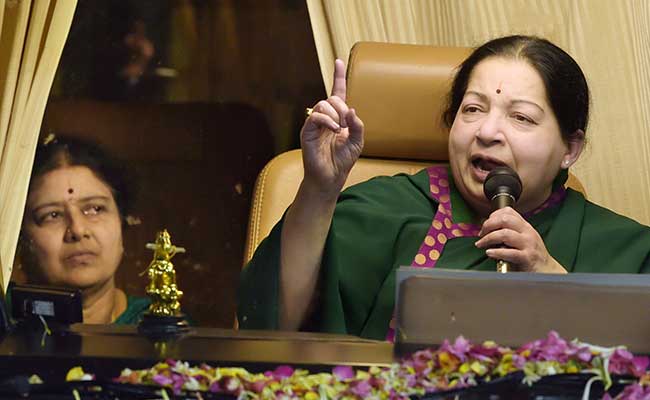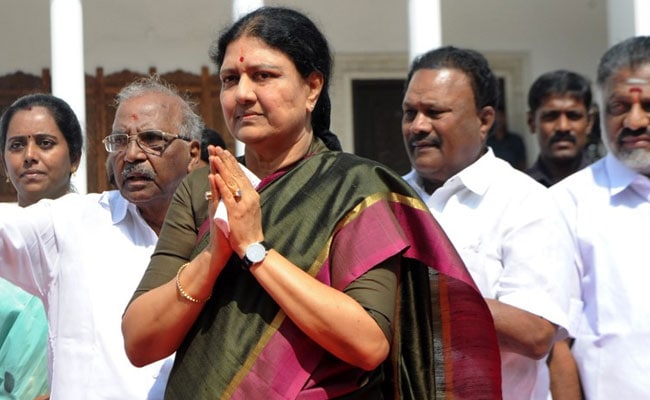Panneerselvam, it might be objected, lacks the presence and charisma required to lead the party. His self-effacing loyalty might endear him to the party faithful and make him an able administrator, but hardly qualifies him to replace the larger than life figure of Amma. Such calculations have clearly occurred within the AIADMK too, since there are already plans to usher him back into the ranks in favour of Jayalalithaa’s trusted companion and confidante Sasikala. Paneerselvam has barely got his knees under the Chief Minister’s desk, but there is a concerted effort by party ministers to vest power in the woman who is affectionately known as Chinnamma (small mother). Sasikala has already been elected General Secretary of the Party and there are calls for her to be made Chief Minister too. In what follows, we reflect on what these machinations tell us about Tamil politics and the possible implications:
The Image Trap
To understand current politics, we first need to return to the origins of the AIADMK. It was founded in 1972 by Tamil screen idol MG Ramachandran (MGR) following his split from the DMK. Tamil cultural historian MSS Pandian details the way in which he meticulously cultivated his on-screen persona to present himself as a champion of the poor and the oppressed. His popularity thus derived blinded many people to the fact that his policies often worked against the interests of the poor. His electoral successes have shaped politics in the state in ways that resonate even today. One of his abiding legacies is the importance of image and stature for leadership contenders. As Vijayakanth demonstrated with his initial foray into politics – popularity and public recognition make up for many failings.

AIADMK General Secretary Sasikala Natarajan with Former Tamil Nadu Chief Minister J Jayalalithaa
There May Be Trouble Ahead
If there are many reasons to embrace Sasikala’s leadership, there are also grounds for caution. For a start, Sasikala has never been elected. She may have been the power behind the throne, but such figures attract jealousy and spite as much as admiration. Many of the most controversial aspects of Jayalalithaa’s history are bound up with Sasikala. Both were indicted under the disproportionate assets case which is still pending in the Supreme Court, Sasikala’s family were expelled from the party in 2011 for seeking to wrest power from Amma, and it was the ostentatious wedding celebrations for Sasikala’s nephew and Jayalalithaa’s foster son Sudhakaran that gained Jayalalithaa a reputation for extravagance and possibly corruption. During Jayalalithaa’s life, Sasikala shouldered much of the blame for these episodes and served to absolve Amma herself. Whether the public are now willing to forgive and forget and transfer their allegiances to Chinnamma or not remains an open question.

Sasikala Natarajan took charge as AIADMK General Secretary on December 31
One further obstacle in Sasikala’s path to public popularity is her caste background. That Jayalalithaa - as a Brahmin – managed to assume leadership in a state shaped by a vehement non- (or even anti-) Brahmin movement was impressive. Brahmins, however, are a numerical minority in the state and have long ceased to be politically influential. Sasikala, however, hails from the Backward Caste Thevar community, which is one of the dominant castes in the state. Not only will this alienate Dalit voters, but the AIADMK’s long cultivation of the Thevar vote-bank will rankle more if the Chief Minister hails from that community and is perceived to be protecting her own. The key question here is whether ethnic identity can trump caste identity in a state where caste calculations inform the political practice. Sasikala, much more than Jayalalithaa, will need to navigate the complex caste equations of Tamil politics with care if she is to reach out and appeal to voters from other castes.
Tests to Come
In other words, whilst her intimate knowledge of the workings of the party, her public renown and her undisputed claim to be Jayalalithaa’s closest aide make Sasikala the perfect choice for the AIADMK, it is too soon to say that the vacuum that opened up in the party has been filled. Caste ties, loyalty and patronage may all bind candidates to a leader, but the history of Tamil politics repeatedly demonstrates that politicians wish to back a winner. Each election sees a wave of defections and transfers as candidates lobby for greater prominence or switch sides to alliances that they think stand a greater chance of winning. For all his wealth and cinematic popularity, Vijayakanth was unable to stem the tide of departures from his party once candidates had determined that his front stood little chance of success.
The true test for the AIADMK, thus, will come in the next two elections. Whether Panneerselvam remains Chief Minister or Sasikala replaces him, neither is experienced in overseeing a campaign and neither has been the star-attraction. If the party can harness a sympathy wave to win the next election, then the leader will be able to establish a reputation for themselves and to build a following. If, however, the DMK can manage its own problems of succession and corruption and emerge as a credible force, then we will really get to test the mettle of the AIADMK. A weak poll showing would probably lead many representatives (especially non-Thevars) to jump ship. If so, the vacuum that currently exists in the AIADMK would really extend to Tamil politics as a whole.
(Hugo Gorringe is senior lecturer in Sociology at the University of Edinburgh. D. Karthikeyan is a doctoral student at the Centre for South Asian Studies at University of Edinburgh)
Disclaimer: The opinions expressed within this article are the personal opinions of the author. The facts and opinions appearing in the article do not reflect the views of NDTV and NDTV does not assume any responsibility or liability for the same.


